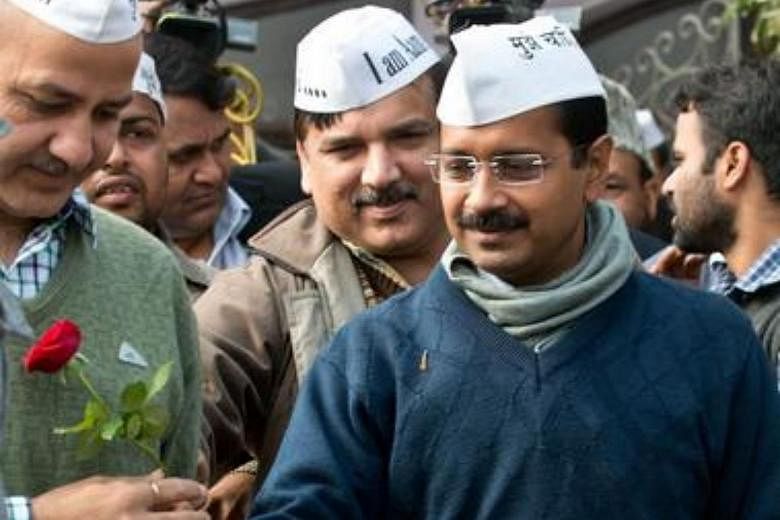NEW DELHI - The Aam Aadmi Party (AAP), which is in power in capital city Delhi, has run into a new road block after 20 of its legislators were disqualified, the latest in a series of troubles facing a party that was born out of an anti-corruption movement.
While the AAP government is not in danger of falling as it still retains a majority with 47 legislators in the 70-member Delhi assembly, the disqualifications could pave the way for mini-elections in the 20 constituencies.
These present Prime Minister Narendra Modi's Bharatiya Janata Party (BJP) or the Congress party with an opportunity to increase theirinfluence in the capital city, which is also the seat of power of the federal government.
The Election Commission, in a decision upheld by President Ram Nath Kovind, disqualified the 20 AAP legislators for holding the post of parliamentary secretaries, who assist state ministers. A lawmaker is not allowed to hold the post, which is classified as an office of profit.
The AAP has argued that it was not given a chance to present its case to the Election Commission and that the legislators were not earning a second salary.
"They have imposed bypolls in Delhi by disqualifying 20 MLAs. The Model Code of Conduct will come into force and all government works will come to a halt," AAP leader and deputy chief minister Manish Sisodia wrote in an open letter to Delhi residents, noting that public money too would be wasted. MLA is short for Member of Legislative Assembly.
"The MLAs you elected were axed without even giving them an opportunity to present their cases.''
The party on Tuesday (Jan 23) filed an appeal to the Delhi High Court against the disqualification.
The five-year-old AAP, or Common Man's Party, led by social activist-turned-politician Arvind Kejriwal, emerged on the Indian political scene in December 2013 with a surprise victory in the Delhi elections, defeating both the BJP and the Congress.
The party, a spin-off from a 2011 popular anti-corruption movement, won the elections on the back of support from a cross-section of the middle class, working class and poor Indians angry with the political establishment.
Many professionals from lawyers to software engineers joined AAP, excited at the prospect of a change in Indian politics.
Yet since its surprise win, the party has gone through multiple crises. It has seen infighting with the departure of prominent members such as lawyer Prashant Bhushan who accused Mr Kejriwal of authoritarianism.
The party did not do well in last year's civic body elections where the BJP maintained a majority and it has continued to have run-ins with the federal government, which still has control over the police and security in Delhi.
The APP's efforts to go national have also not panned out, with poor showing in a spate of elections in states like Goa.
Analysts said the disqualifications were yet another setback for the party, which critics believe has not lived up to its promises.
"The party is not as popular as it used to be in 2015... at the moment there is no immediate crisis for the government but I think there is a long-term crisis for the party. People are already voicing opinions saying that these appointments were a decision of Mr Kejriwal,'' said Professor Sanjay Kumar, director of the Centre for the Study of Developing Societies.
"We get a sense of crisis one after another. This is not unusual for a new party. They have had quick success, and now they have to run the (Delhi) government, expand the party and there are people within and outside the party who have expectations," he said.
"But the middle class, the main supporters of the party initially, sees it as just another political party now.''
Still, the AAP is seen to have done some good work in Delhi.
It has implemented populist measures such as cutting power tariffs and waiving monthly charges for the first 20,000 litres of water for every household.
In education, it has carried out reforms in government schools, including introducing parent-teacher meetings; in health, it has opened up mohalla clinics that offer basic healthcare free of charge to the poor.
Analyst Bidyut Chakrabarty, a political science professor at Delhi University, said the party still has pockets of support among the poor in Delhi and that the disqualifications should not hurt its support base.
"The AAP has done something substantial to those who live in slums and these people are the ones who vote (in India), not the middle class. The AAP phenomenon is very local and limited to Delhi,''he said.
"I think in the next 2½ years, if AAP manages to retain its base, it still has a future in Delhi. But it will be tough for the party to go national.''


